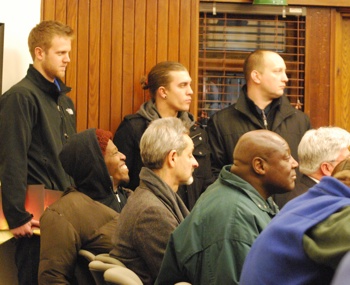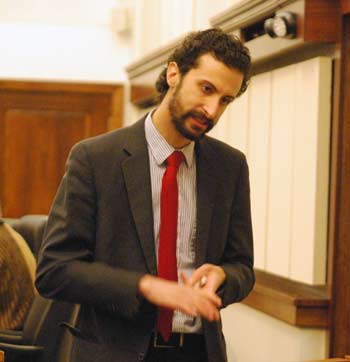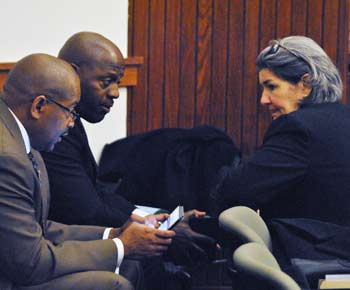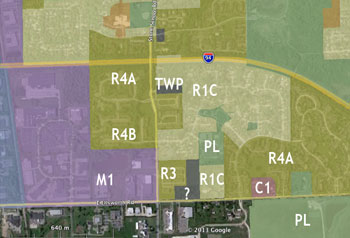Future of County’s Platt Road Site Debated
Washtenaw County board of commissioners meeting (Feb. 5, 2014): Two items drew most of the debate during the county board’s recent meeting: Dealing with the future use of county-owned property on Platt Road, and hiring a contract worker to help with the budget process.
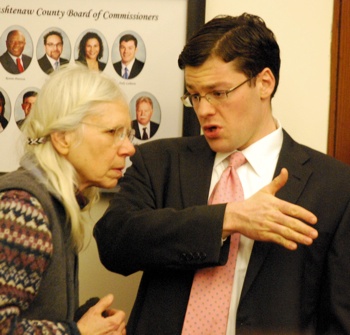
Jeannine Palms, who served on a citizens advisory committee to make recommendations for the county-owned property at 2260-2270 Platt Road, talks with commissioner Andy LaBarre (D-District 7), who helped lead that effort. Palms spoke during public commentary to praise the process and urge commissioners to adopt the recommendations. (Photos by the writer.)
A citizens advisory committee made recommendations for the 13.5-acre site at 2260-2270 Platt Road, and included the desire to use a portion of the land for affordable housing. Inclusion of affordable housing is a condition for accepting a $100,000 planning grant from the state, and that condition worried some commissioners. Rolland Sizemore Jr. (D-District 5) was particularly vocal in disagreeing with this approach. He suggested selling the land instead, then using the proceeds to pay for repairs and renovations of existing houses in the county, including those for sale through tax foreclosure auctions.
The board voted to give initial approval to the Platt Road recommendations, over dissent from Sizemore. A final vote is expected on Feb. 19. If approved, the county would then launch a much broader community planning process to determine the future use of that site.
Also debated at length was a proposal to hire a contract worker who would support budget-related work for the county board and administration. Commissioners had also discussed this issue during the board’s Jan. 22, 2014 meeting, when Ronnie Peterson (D-District 6) questioned the process for hiring this kind of staff support. On Feb. 5, several commissioners expressed concern about spending money on this position and wanted more details about funding and duties. Those concerns led to a unanimous vote to postpone the item until March 5.
A proposal to create a dental clinic for low-income residents received initial approval on Feb. 5, over dissent from Dan Smith (R-District 2). The $1.5 million project includes partnering with the nonprofit Michigan Community Dental Clinics Inc. to run the clinic and with St. Joseph Mercy Health System, which would contribute space at its Haab Building in Ypsilanti at little to no cost. A final vote is expected on Feb. 19.
In other action, the board gave final approval to two items with no significant discussion: (1) creation of a new countywide program to help finance energy-efficiency projects for commercial properties – the Property Assessed Clean Energy (PACE) program; and (2) a new ordinance that allows the county to issue municipal civil infractions for owning an unlicensed dog. The county treasurer’s office – which is responsible for administering the dog licenses – expects to implement the changes in June or July, following an educational outreach effort.
Commissioners also passed a resolution urging Gov. Rick Snyder to use the state’s budget surplus in part for road repair, and approved a resolution honoring local attorney Jean Ledwith King for her service on the county’s historic district commission.
Commissioner Yousef Rabhi (D-District 8) gave an update on efforts to address services to the homeless community. Advocates for the homeless had attended the board’s previous meeting, on Jan. 22, 2014. The board received a more detailed update on this situation at its Feb. 6 working session. That session will be covered in a separate Chronicle report. [Full Story]




